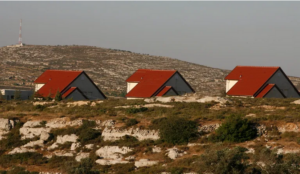In first, Israel’s High Court orders police to investigate illegal settlement activity in West Bank

Houses at Hayovel outpost in the West Bank in 2010
Yael Freidson reports in Haaretz on 10 May 2024:
Israel’s High Court of Justice ordered the state to open a criminal investigation into widespread illegal construction at the Hayovel outpost, adjacent to the settlement of Eli in the West Bank.
It would be the first time that Israel Police would investigate illegal Jewish construction in the West Bank since the erection of outposts – settlements considered illegal even under Israeli law – began in the 1990s.
The high court decision came in response to a 2018 petition against the construction of a new residential neighborhood in Hayovel, which was approved without the required building plan and building permits.
The petitioners argued that the Mateh Binyamin Regional Council, which is responsible for the area in which the construction was carried out, was involved in advancing and funding the illegal construction.
The petition that was granted was one of six similar cases submitted by non-governmental organization Peace Now. The petitions also demanded investigations into illegal construction at the settlements Givat Haroeh, Karnei Shomron, Shvut Rahel and Sde Boaz.
State representatives, responding in 2021, didn’t dispute that the construction was illegal. Rather, they claimed in their defense that the state would establish a unit for criminal enforcement against illegal construction through the Civil Administration.
The state claimed at the time that this unit would investigate suspicions of building and construction violations over the Green Line. It also claimed that this unit would handle the investigation of Hayovel and similar cases.
However, the state nixed the unit after Bezalel Smotrich became a minister in the Defense Ministry and took control of most of the Civil Administration’s authority. In light of this development, Justice Daphne Barak-Erez and Justice Ruth Ronnen granted the petition and ordered the investigation against the Mateh Binyamin Regional Council, building contractor A. H. Kalfon Earthworks Company Infrastructure and Development Ltd., and others who were involved in the building and construction.
“Under these circumstances, when the designated unit was never even established – the conclusion that an investigation must be carried out through other means becomes inevitable,” they wrote.
Justice Yael Willner wrote the minority opinion that the court should suffice with an order obliging the authorities to decide whether to open an investigation within 90 days. She argued that the court “does not replace the opinion of authorized officials and does not decide in their place.”
Justice Barak-Erez noted that the court had dismissed similar petitions over the years because the state had declared that it would establish a designated law enforcement unit within the Civil Administration. She also responded to Willner’s proposal to order the state to make a decision, remarking, “If there is a resource this court hasn’t spared in the current case, it’s additional time to formulate a decision.”
Therefore, she argued that it was time to grant the petition. “Lacking any substantive answer to the question why not open an investigation, we have been left with a sweeping and unexplained delay of following up on suspicions regarding the execution of planning and construction violations in the region,” she explained.
Barak-Erez ended the decision with criticism of the state’s conduct. “I cannot conclude without noting – without connection to the issue at the center of this petition – that we cannot accept a situation in which repeated declarations of the state, and all the more so the kinds that have led to dismissing petitions, end with nothing. In order for us to honor the state’s decisions, the state must honor them itself. In fact, from my point of view, in this case it’s the heart of the matter.”
Attorney Michael Sfard, who represented Peace Now in the case together with attorney Alon Sapir, commented, “Illegal construction in the outposts and in the settlements is an organized crime of epic proportions.” He said: “The time has come for law enforcement authorities to do their job. It’s a shame that legal intervention was needed to make it clear to the police and to the state attorney’s office that no one is above the law, including settlers.”
This article is reproduced in its entirety
